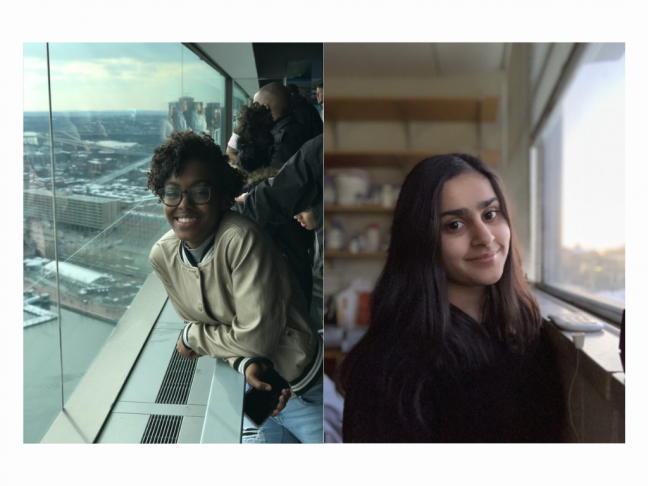There are few disciplines that change as rapidly as science. New research is conducted and published every day, and it takes just one discovery to send years of study into upheaval. Despite being such a dynamic field, science has managed to maintain a striking trend — the underrepresentation of women.
According to the U.S. Census, in 1970 women held only 8% of the science, technology, engineering and math — or STEM — careers in the U.S. In 2019, the numbers rose to depict women being almost half of the workforce but still holding only 27% of the available STEM jobs, showing progress but also a prevailing disparity.
For women of color, representation is incredibly lacking. As of 2017, Black women only made up 2% of the STEM workforce, according to the National Science Foundation. Asian women made up 5%, and Hispanic women also represented 2% of STEM workers.
Lack of access to STEM careers also means lack of access to some of the highest paying jobs available. On a list of 20 occupations with the highest median salaries from the U.S. Bureau of Labor Statistics, 17 were in STEM fields including medicine, engineering, and computer sciences.
As a computer science major, UW junior Carla Rose said she has felt these disparities in her classrooms.
“Looking around my class I am the only person of color, the only Black woman,” Rose said. “I feel like there’s definitely a lack of support for students like me and I think that has become very deterring.”
In her time at UW, Rose has worked to create spaces and community for students of color within computer science. During the pandemic, Rose implemented the Multicultural Computer Science Study Table, which provides tutoring and drop-in hours.
Skipping sleep to study for finals comes at a cost, UW researchers say
Rose also brought ColorStack, a national organization with the goal of providing community to computer science students of color, to UW.
“The [computer science] department was really supportive of trying to create an organization for that community. What I did was have to look at different national orgs that had that same mission and same community already started,” Rose said. “I was able to connect with the ColorStack national organization and now this year we’re able to get everything started to be a registered student org.”
Rose said feelings of inferiority have been a challenge throughout her academic career, however creating her own spaces for community and support along with working with professors and faculty to address the lack of support for students of color has helped her to navigate this.
In an email statement to The Badger Herald, UW spokesperson Meredith McGlone said the Computer Science department offers programs such as the Wisconsin Emerging Scholars–CS, which provides support for historically marginalized students and those who are new to programming.
In addition, the Wisconsin Science and Computing Emerging Research Stars is a new mentorship program started by CS faculty members to foster research participation among undergraduate students, with a particular focus on students from historically underrepresented groups, according to McGlone.
“We value the work of students who are engaged in the creation of spaces where they can build community, and we strive to support these efforts through advising support and financial resources,” McGlone said.
Through her research in paleontology, UW junior and genetics major Shailaja Singh has experienced working in a white male-dominated field.
“Fields like paleontology, anthropology and archaeology do have their history intertwined with colonialism and white supremacy. And you can’t really separate yourself from that history, it’s important to acknowledge it,” Singh said.
Singh currently works in a geology lab prepping fossils for further study and has been fascinated with paleontology since she first picked up a dinosaur book as a toddler.
The Lab Report: Anantharaman Microbiome Lab digs into Lake Mendota’s bacteria
“I talked about studying the flipper of the pliosaur, and the bones in their flipper look so similar to human fingers. It just shows we’re all connected.” Singh said. “Through paleontology we can learn a lot about our climate, where our species came from, and life in general.”
Despite a love for the field, Singh noted the lack of women present. One example is that for on-site digs, most universities do not have a sexual harassment policy in place. Singh said so few women participate in these trips that institutions don’t feel the need to address possible risks.
Despite working on three different research projects, Singh has only had one female PI, a fact she said she is very aware of. Discussions with this PI included recollections of sexual harassment and crude remarks that used to be the norm for female scientists. At least times have changed enough that in theory, an institution would do something about those behaviors today, Singh said.
In fields that lack representation for women and especially women of color, both Rose and Singh are heavily involved in impressive work.
UW research suggests more complicated link between plankton, clouds than originally thought
In addition to her advocacy and creation of spaces for students of color, Rose has also worked in the Simulation Based Engineering Lab, completed an internship with Google, and is prepared to go into a career in software engineering. Despite this, she considers her greatest achievement to be solidifying what she wants to do for the rest of her life.
Alongside her extensive research experience in the fields of geology, anthropology and virology, Singh is involved in a stem-cell research student organization and has taken on several writing projects including being an associate director for the publications committee for the Wisconsin Union Directorate (WUD). When it comes to facing a field with very little representation, Singh only sees it as motivation to succeed.
“You always wonder ‘are they really seeing me as their equal?’ But then another part of me thinks ‘even if they don’t, I’ll just be better than them out of spite,” Singh said.


















